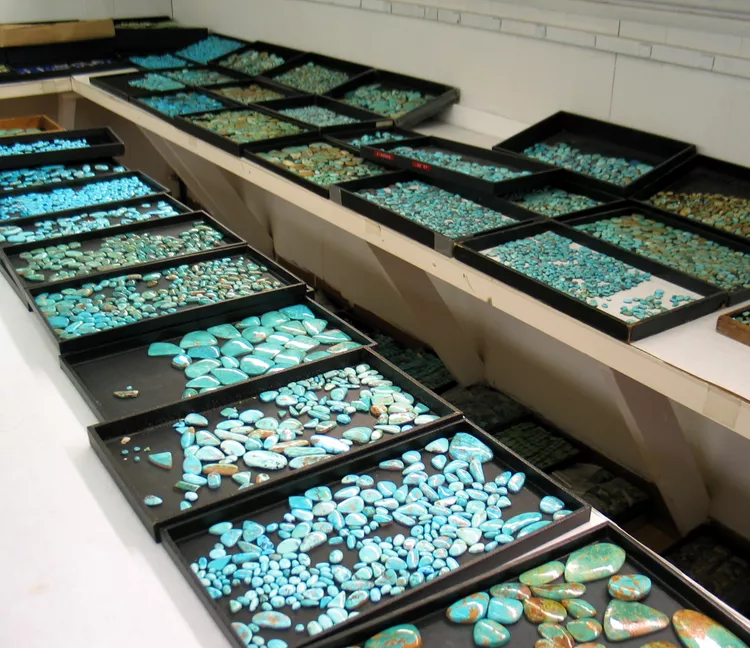Summary
- What is Turquoise?
- Turquoise – Found in Arid Zones World-Wide
- Turquoise is Mined in Many Southwest States
- Trading for Turquoise
- Not All Turquoise is Equal
- Visit a Trading Post to See Southwestern Turquoise Designs
- American Turquoise, A Wise Investment
- Learning More About Turquoise
- Hooked on Turquoise
I just love Turquoise! When I visited the Perry Null Trading Company in Gallup, New Mexico, I had the pleasure of touring the vaults and back rooms. There I saw a great variety (and quantity) of turquoise stones. I didn’t know much about turquoise at the time, but I knew I was drawn to the stone and the art of the local Native Americans who crafted silver jewelry using the stones from Perry’s vaults.
So when I received a recent Perry Null newsletter, I especially enjoyed learning more about beautiful turquoise. This article draws from the information shared in the newsletter.
What is Turquoise?
Turquoise is a semi-precious stone related to copper, composed of hydrated copper and aluminum phosphate. The more copper in the stone, the bluer the turquoise will appear. I saw veins of turquoise when I visited the Copper Queen Mine in Bisbee, Arizona.
Turquoise – Found in Arid Zones World-Wide
Turquoise is found worldwide; however, American Turquoise captivates many collectors and buyers. It has a profound connection with Native American peoples, drawing many enthusiasts to this sacred stone. Collectible turquoise can be sourced from various Southwest and Western states.
Turquoise is Mined in Many Southwest States
In New Mexico, the famous Tiffany Mine produced gorgeous Cerrillos Turquoise and stunning Tyrone Turquoise from the southern part of the state. Arizona is home to one of the most famous American stones, Bisbee. Additionally, you will find highly sought-after Morenci, Kingman, and Ithaca Peak Turquoise from Arizona.
To the north, Colorado produces two unique stones, Villa Grove and Manassas Turquoise, with gem-quality Villa Grove Turquoise being some of the finest ever seen.
Nevada is another essential player in the turquoise conversation, home to several renowned classic American mines, including Blue Gem, Indian Mountain, Red Mountain, Number Eight, Lone Mountain, and Lander Blue Turquoise.
Trading for Turquoise
Perry Null, like many long-time traders in Gallup, has been buying turquoise for over thirty years. This extensive experience enables him to identify and evaluate specific turquoise stones while hearing many mining stories. His passion for this stone continues, leading him on a journey to find rare and unique American turquoise.
Not All Turquoise is Equal
In the 1970s, Perry encountered a turquoise dealer wanting to sell a large collection of Number Eight stones during the height of the Native American jewelry boom. Most turquoise from this Nevada location is of the spiderweb variety, with matrices ranging from golden brown to black. Gem-quality Number Eight turquoise is highly collectible.
During this time, a stone priced at $1 per carat was considered expensive compared to today’s costs exceeding $100 for certain specimens. The deal was made, and Perry acquired a stunning collection of Nevada Number Eight Turquoise Stone, which has since become a favorite of his.
Visit a Trading Post to See Southwestern Turquoise Designs
During your visit to Perry Null’s Trading Post in Gallup, New Mexico, there is a great opportunity to see Perry wearing one of his remarkable turquoise pieces.
His showcases feature many treasures from classic American mines that we admire. He enjoys purchasing turquoise, creating magnificent pieces of jewelry from his collection, and showcasing turquoise jewelry.
American Turquoise, A Wise Investment
So how does one acquire turquoise? Visiting a reputable dealer, such as those in the major Gallup Trading Posts, is a good start. These family-run businesses have been operational for decades.
Ask Questions: Ensure the stone is “natural” and not reconstituted or stabilized. Natural stones come from the earth and are polished before setting into jewelry. Inquire about the mine the stones originated from and the processing methods.
Additionally, ask for the artist’s name and the tribal affiliation to validate authenticity. Reputable dealers often provide certificates of authenticity for exquisite pieces.
Learning More About Turquoise
Several mining museums in the Southwest offer a chance to view turquoise specimens and learn about this captivating stone:
- Arizona State Museum – University of Arizona Campus, Tucson.
- ASARCO Mineral Discovery Center – Sahuarita, Arizona, next to the ASARCO copper mine complex.
- Heard Museum – Phoenix, Arizona.
- Maxwell Museum of Anthropology – University of New Mexico campus, Albuquerque, New Mexico.
- Copper Queen Mine Tour and Exhibits – Bisbee, Arizona.
- Millicent Rogers Museum of Northern New Mexico – North of Taos, New Mexico.
- Museum of Northern Arizona – Flagstaff, Arizona.
- Tucson Gem and Mineral Shows – Annual sales and exhibitions held in February.
- Turquoise Museum – Albuquerque, New Mexico.
Hooked on Turquoise
After assembling this article, I am even more captivated by turquoise. I want to explore the museums, spend time in the Trading Posts, and delve into more literature about this blue wonder. I don’t suppose that finding out turquoise is my birthstone (December) has anything to do with this!
References:
Joe Dan Lowry and Joe P. Lowry, Turquoise Unearthed, Rio Nuevo Publishers, Tucson, Arizona, 2002.
July 2007 Newsletter, Perry Null Trading Post, Edited by Jason Arsenault.




